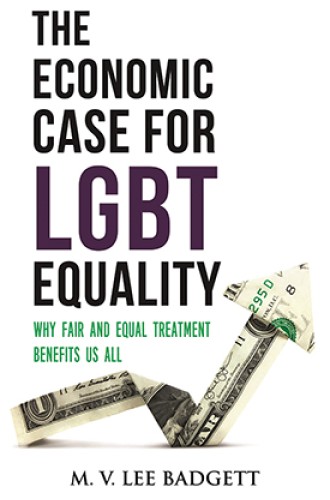Since the US Supreme Court decisions in Obergefell v. Hodges (which legalized same-sex marriages in 2015) and more recently Bostock v. Clayton County (which prohibited workplace discrimination based on sexual orientation or gender identity), the legal protections for LGBT people in America have never been stronger. And yet, in the same week that the Bostock decision was announced, the Trump administration finalized a rule removing nondiscrimination protections for LGBT people in health care and health insurance. Clearly LGBT equality is not yet a reality in America, and it’s certainly not a reality in many other places around the world.
M. V. Lee Badgett is well suited to tackle the economics of LGBT equality. As a professor of economics at the University of Massachusetts Amherst, she has spent her entire career researching LGBT issues and is one of the world’s leading economists in this area. In this book she compiles an impressive collection of evidence to argue that increasing LGBT equality improves economic outcomes not only for LGBT people but also for companies and entire countries.
Read our latest issue or browse back issues.
Badgett summarizes how discrimination in schools, workplaces, and health-care systems negatively affects LGBT individuals’ education, wages, and health outcomes. She demonstrates how businesses that support LGBT rights—both for their employees and in society more broadly—are rewarded with lower costs (by retaining highly skilled workers) and higher profits (by attracting LGBT consumers). Finally, she aggregates and extrapolates data to estimate the effects of LGBT discrimination on country-level economic outcomes.
In one back-of-the-envelope calculation, she estimates that the global annual cost of homophobia and transphobia is around $880 billion. This figure is largely attributed to lower productivity of LGBT workers who have had less education, fewer employment opportunities, and poorer health outcomes than their heterosexual and cisgender peers.
At the core of this book is an inherent tension between the cold, calculating lens of economics and broader appeals to human rights. Highlighting the business benefits of LGBT equality can make discussions about basic fairness and nondiscrimination feel transactional. Badgett responds to this tension by claiming that “the economic case for equality is a compatible complement to the human rights argument, not a replacement for it.” She makes a deeply pragmatic argument that “the economic case is an idea that can go places the human rights strategy cannot, putting a new kind of pressure—both carrots and sticks—on governments, businesses, education systems, and healthcare systems.”
Who, then, is the audience for this book? In my view, it is people involved in government, businesses, education systems, and health-care systems who are looking for pragmatic arguments around issues of LGBT equality. It is not really for individuals looking to better understand why LGBT equality is a moral end in and of itself. The book is not well suited to change hearts and minds on its own. I envision activists using Badgett’s book as a sort of encyclopedia from which to pull statistics and citations when interacting with powerful decision makers. Indeed, large swaths of the book feel merely like a compendium of statistics: helpful and valuable, but in many ways old news to those of us who have been paying attention.
A great deal of this book focuses on the fight for LGBT equality around the world, especially in low-income countries and those with few legal protections for LGBT people. There are many of them: currently 69 countries consider homosexuality a crime, 11 countries allow the death penalty for people who have sex with someone of the same sex, and at least 57 countries have criminalized transgender people. Badgett believes that the economic case for LGBT equality may be more effective at driving change in these countries than appeals to human rights would be. Although she may be right, it is difficult not to feel the vestiges of colonial and capitalist power structures in such arguments. Wielding economic carrots and sticks, even with virtuous intentions, can seem at odds with the competing goals of self-determination and poverty reduction.
On the other hand, the economic case has opened the door for powerful organizations to pursue LGBT equality when they otherwise may not have been able to do so. Badgett highlights the example of the World Bank, whose articles of agreement prohibit the bank from interfering with countries’ political affairs and only allow it to act based on “economic considerations.” Framing LGBT equality as an economic issue has allowed the World Bank to incorporate this goal in its work and exert pressure on member countries to increase protections for their LGBT citizens.
For decades, researchers like Badgett have struggled to properly analyze the economics of LGBT equality. They have faced low-quality or nonexistent data, a lack of interest from academic journals, and skepticism from human rights–focused allies. The Economic Case for LGBT Equality is an excellent summary of what research from the past half century has taught us. It accentuates the huge economic cost of LGBT discrimination and provides resources for pragmatic policy advocacy. Is this the one book you should read about LGBT issues? No. But it is an important addition to the broader pursuit of a more equal future.






